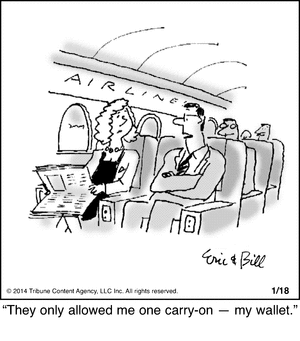|
In summary, we said:
This merger, if approved, would create the largest U.S. airline in history and reduce the number of air carriers to four major airlines. As such, this is a watershed event that could determine if the era of price competition that began in 1978 with airline deregulation will be transformed into a new oligopoly system that supports anticompetitive behavior.
Due to the lack of low cost airlines in the U.S., FlyersRights now supports allowing selected foreign low cost carriers to fly domestic routes.
The DOT has the sole authority to issue and enforce regulations to prohibit "unfair or deceptive" airline practices, but it has rarely done so without the approval of the airlines.
Its record of enforcement by fines is dismal, with fines regularly reduced by 50% or more and nearly all violations settled by consent orders or findings in favor of the airline with zero fines.
Its handling of consumer complaints is even worse. It rejects 90% of complaints as not within its jurisdiction as allegedly not violating any DOT rule and merely asks the airline to respond.
Legislation blocking anti-competitive practices is now essential to continue the era of price competition and consumer choice.
Price competition is rapidly eroding in the airline industry. We call on the DOT to eliminate anti-competitive airport practices and empower airline passenger interests to balance the interests of the air transportation industry.
The 2011 acquisition of Airtran by Southwest Airlines is instructive. It discontinued service to Sarasota Florida (and five other medium size cities) in favor of Southwest service at Tampa (65 miles away) thereby reducing Sarasota enplanements by over 300,000 per year and raising airfares, travel time and expenses for passengers.
No other low cost carrier has come in to replace Airtran which provided real price competition for Southwest and other carriers and no other one really exists except on very limited routes (Southwest is no longer a low cost carrier by most definitions but competes largely on service, lack of baggage fees and more liberal cancellation policies). The USAirways-American merger will certainly reduce competition further.
The record of prior airline mergers makes clear that fares generally increase and service is reduced to smaller and medium size cities and concentrated at fortress hubs.
Unless stopped, the airline penchant for mergers (USAir-America West 2005, Delta-Northwest 2008, Republic-Midwest 2009, Republic-Frontier 2009, United-Continental 2010, Southwest-Airtran 2011) coupled with the lack of new entrants and the loss of most low cost air carriers, will soon result in oligopoly or to re-regulated monopolies, with air transportation operating more like AMTRAK.
Airline mergers also mean thousands of jobs lost, contractors replace union workers, retirement plans are reduced or wiped out, airplanes are sold, routes are eliminated, quality of service typically plummets during costly airline merger transitions. Safety margins may also be reduced, and passengers will pay more, while retiring executives take golden parachutes and remaining ones cash in with higher pay.
American Airlines plans to cut at least 14,200 jobs and void union contracts -the perks of Chapter 11.
Competition and even Chapter 11 bankruptcy can be great mechanisms for fostering efficient low cost air travel, and are not necessarily unprofitable.
USAirways is already quite profitable and seeks to be more so, while its CEO seeks to realize his dream of leading the largest U.S. airline in history.
There is little doubt American, which has a very large cash reserve, would also be profitable if it emerged from bankruptcy as a stand-alone company after shedding unaffordable union contracts, add more passenger and labor friendly management, and increase passenger representation on its board of directors.
We believe this proposed merger of American and USAirways should be restructured or disapproved by the Justice Department, unless competition is clearly not reduced and passenger rights are well protected by new legislation and rulemaking.
Just over a decade ago, there were 10 major airlines. Now the merger of USAirways and American will leave only four carriers -American, Delta, Southwest, and United.
These four carriers will control nearly 85 percent of U.S. air travel, leading to less choice, higher fares and fewer flights.
As we've been writing about for years, fares have been rising, planes are packed and flying has never been more of a hassle.
The future of commercial air travel appears bleak.
| 










